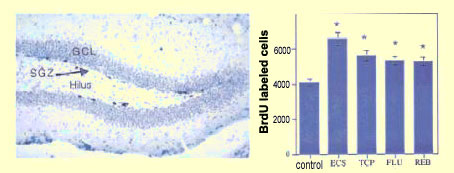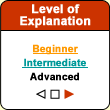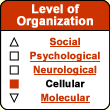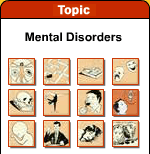|
|



Many experiments have
shown a close connection between reduced neurogenesis in
the hippocampus and elevated
glucocorticoid levels induced by stress.
In rats, ablation of the adrenal glands that secrete glucocorticoids
increases neurogenesis in the dentate gyrus of the hippocampus.
This effect can be reversed by the injection of a glucocorticoid
such as corticosterone. Similarly, the continued administration
of corticosterone can prevent neurogenesis in the dentate gyrus
of normal rats.
Some situations that are naturally stressful for animals also
have a negative impact on neurogenesis. For example, exposing
a rat to the scent of one of its natural predators, such as
a fox, will reduce the growth of new neurons in the rat's dentate
gyrus. The same thing happens when rats are subjected to a
psycho-social stress, such as when two rats of the same sex
are placed together in the same cage.
|
|
|
| ANTIDEPRESSANTS
AND THE GROWTH OF NEW NEURONS |
|
The hypothesis that the rate of formation
of new neurons (neurogenesis) in the hippocampus might have some
connection with depression is still recent. It has been widely
criticized, and even its defenders concede that a decline in neurogenesis
in the hippocampus is certainly not the only neuronal change that
occurs in depression.
But a number of facts seem to point surprisingly clearly to a role
for neurogenesis in depression, and the weight of this evidence
is hard to ignore:
- Stress, which often leads to depression,
reduces neurogenesis in the hippocampus.
- Antidepressants that improve patients'
moods increase the rate of formation of new neurons in the hippocampus.
- When antidepressants are administered
to animals, it takes two to three weeks before the rate of neurogenesis
increases, and then another two weeks before the new neurons
become functional. This is just about the same amount of time
that it takes for antidepressants to start having an effect on
a patient's morale.
- If an antidepressant is given during a
period of chronic stress, it prevents the decline in neurogenesis.
- Exercise, which improves morale in depressed
people, also promotes neurogenesis in the hippocampus.
- Electroshock treatment has these same
two effects.
- Lastly, in numerous autopsies of people
who suffered from depression, their hippocampi were found to
be smaller than normal.

Section of the dentate gyrus
of the hippocampus, showing newly formed cells. These are
the darker cells in the subgranular zone (SGZ), and they
have been labelled with 5-bromo-2-deoxyuridine (BrdU), an
analogue of thymidine.
The histogram shows that various antidepressant treatments
increase the number of new labelled cells. The treatments tested
include electroconvulsive shock (ECS), the MAOI tranylcypromine
(TCP), the SSRI fluoxetine (FLU), and the selective norepinephrine
reuptake inhibitor reboxetine (REB). |
Even those authors who have called attention
to these converging observations freely admit that it is far from
certain that reduced neurogenesis in the hippocampus is the primary
factor in triggering depression. It seems more likely that after
patients have fallen into a depression, the decline in neurogenesis
helps to keep them there, or at least makes it harder for them
to develop the new mental constructs that they would need to come
out of it. |
|





